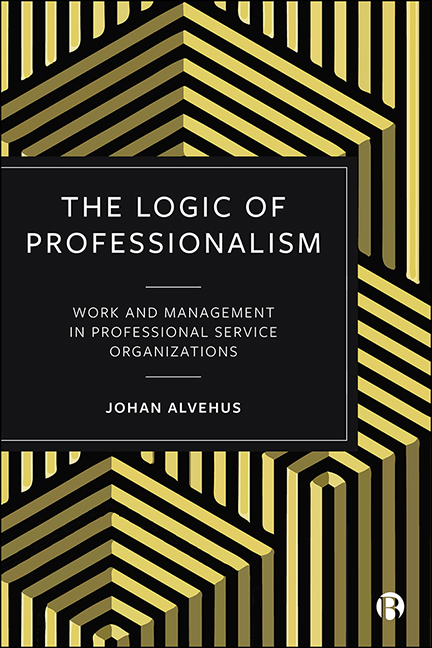Book contents
- Frontmatter
- Dedication
- Epigraph
- Contents
- About the Author
- Preface
- 1 Work in Professional Service Organizations
- 2 Professionalism from an Institutional Logics View
- 3 The Ambiguity of Professional Service Work
- 4 Control, and Control over Control
- 5 The Politics of Leadership
- 6 Superficial Hybridity
- 7 Understanding the Logic of Professionalism
- 8 The Future of Professional Work
- References
- Index
6 - Superficial Hybridity
Published online by Cambridge University Press: 30 April 2022
- Frontmatter
- Dedication
- Epigraph
- Contents
- About the Author
- Preface
- 1 Work in Professional Service Organizations
- 2 Professionalism from an Institutional Logics View
- 3 The Ambiguity of Professional Service Work
- 4 Control, and Control over Control
- 5 The Politics of Leadership
- 6 Superficial Hybridity
- 7 Understanding the Logic of Professionalism
- 8 The Future of Professional Work
- References
- Index
Summary
Recently, the notion of the ‘hybrid organization’ has become rather popular, especially in the context of professional service organizations. It is hard to trace the origins of the term, and its meaning is somewhat unclear – in the context of discussions of professions, the earliest use I have been able to trace was Wilensky (1964). Whatever hybrid means in this context it is however hard to argue that it is something fundamentally new, despite often being marketed as such – the standard ‘everything is changing so fast and becoming so complex that organizations have to find new solutions’-rhetoric. The newness probably lies in the term rather than the phenomenon, as is all too often the case in the social sciences. Judging from the literature on professional service organizations in the last few years, these organizations have seemingly undergone a tremendous shift in the way they are managed, governed, and structured. Previously, it is said, they were dominated by a professional logic. Increasingly, however, this logic has been challenged by bureaucratic logic or market logic (or other logics), and this has given rise to new, hybrid organizational forms. Professionals in such hybrids are in one way or another forced to deal with several, possibly inconsistent or conflicting, institutional logics in their everyday work.
I will, at the end of this chapter, return to whether this view has merit – I am generally sceptical. But first, we need to look into what this whole notion of hybridity means, and how it has been dealt with in theorizing. After this I discuss three dominant hypotheses on how hybridity plays out in organizations: the degradation hypothesis, the harmony hypothesis, and the loose couplings hypothesis. After this I start problematizing the notion of hybridity more fundamentally, explicitly drawing on the way I theorized institutional logics in Chapter 2. I then continue by suggesting a fourth hypothesis with which to understand hybridity: superficial hybridity, and I finish the chapter by suggesting that conflicts between institutional logics should primarily be understood in terms of redundancy.
What is hybridity?
Hybrid organizations, broadly speaking, are organizations that encompass several, potentially conflicting, institutional logics and blend these. This leads to the assumption that such organizations have to deal with a certain, and unique, set of organizational problems, that do not appear in ‘pure’ organizational forms.
- Type
- Chapter
- Information
- The Logic of ProfessionalismWork and Management in Professional Service Organizations, pp. 88 - 105Publisher: Bristol University PressPrint publication year: 2021



